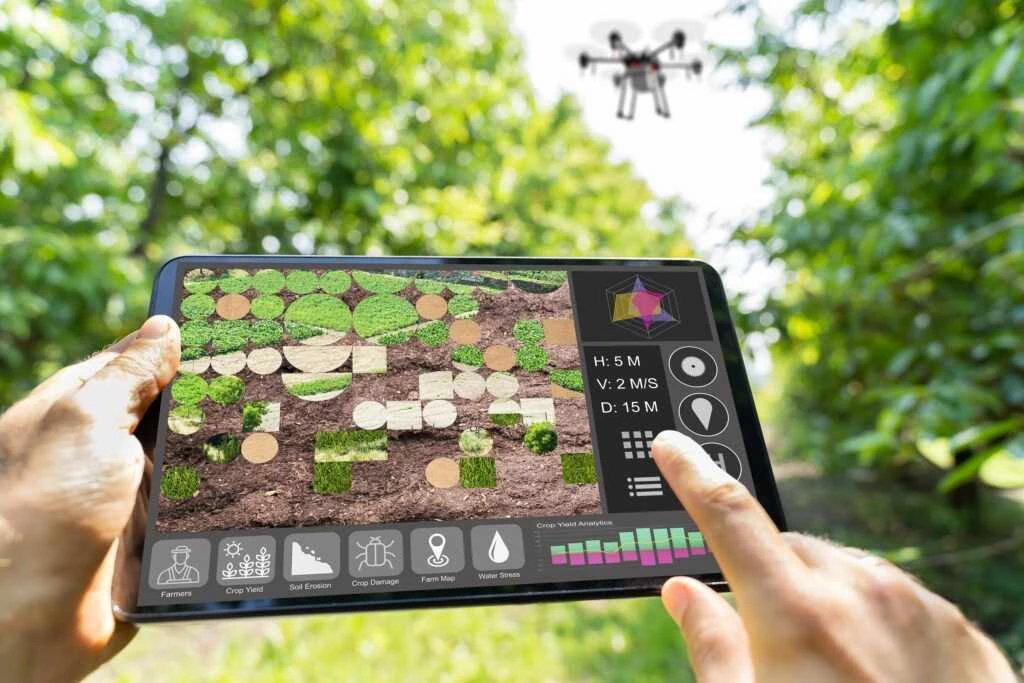In recent years, technology has revolutionized many industries, and agriculture is no exception. One of the most exciting innovations making waves in farming today is the use of drones. drones will play a central role in the future of agriculture by enhancing precision, improving efficiency, promoting sustainability, and empowering farmers with valuable insights. As the technology continues to evolve, its potential will only grow, making farming more data-driven, automated, and sustainable. At eBijuka Bharatgrolink, our mission is to empower farmers with the tools they need to improve their farming practices, increase yields, and enhance sustainability—and drones are one of the most powerful tools available today.
What Are Drones in Farming?
Drones, or unmanned aerial vehicles (UAVs), are aircraft that can fly without a pilot onboard. In farming, drones are used for a variety of tasks, from crop monitoring to spraying pesticides and fertilizers. With high-tech cameras and sensors, drones can provide real-time data on crop health, soil conditions, and overall farm performance. This allows farmers to make informed decisions and take actions that directly improve productivity.
How Drones Can Improve Farming Practices :
- Crop Monitoring and Health Assessment
Drones make it easier for farmers to monitor large areas of farmland quickly and accurately. Equipped with high-resolution cameras, drones can capture images of crops and detect early signs of disease, pest infestations, or nutrient deficiencies. With this information, farmers can take proactive steps to address issues before they become serious problems. This means healthier crops and more efficient use of resources.
2. Precision Agriculture
One of the most significant advantages of using drones in farming is the ability to practice precision agriculture. Drones can provide detailed data on soil moisture levels, crop health, and more. This helps farmers target specific areas that need attention, whether it’s applying water, fertilizer, or pesticides. Instead of treating the entire field the same way, farmers can focus on what each crop needs, which leads to better yields and reduced costs.
3. Efficient Pest and Weed Control
Drones can be equipped with sprayers to distribute pesticides and herbicides more efficiently. With drone technology, farmers can precisely target areas where pests and weeds are present, reducing the need for widespread pesticide use. This not only helps save money but also minimizes the impact on the environment and the surrounding ecosystem.
4. Better Irrigation Management
Water management is critical for crop health, especially in regions that experience irregular rainfall. Drones equipped with thermal sensors can help farmers monitor soil moisture levels across different parts of their field. This allows for more precise irrigation, ensuring that crops receive the right amount of water when they need it, reducing water waste and improving crop health.
5. Saving Time and Resources
Traditionally, farmers would have to walk or drive across large fields to monitor crops, which is time-consuming and physically demanding. Drones can cover vast areas in a fraction of the time, enabling farmers to gather data quickly and efficiently. This saves farmers valuable time and helps them focus on other important aspects of their farming operation.

How eBijuka Bharatgrolink Is Empowering Farmers with Drone Technology
At eBijuka Bharatgrolink, we believe in empowering farmers with the latest technology to improve their agricultural practices. By integrating drones into everyday farming, we are helping farmers save time, reduce costs, and increase crop yields. Our platform provides farmers with the knowledge and resources to use drone technology effectively, making precision farming more accessible to all.
We offer training, support, and guidance on how to integrate drones into your farming practices. From understanding how drones can benefit your specific crops to learning how to use them for monitoring, spraying, and irrigation, eBijuka Bharatgrolink is here to help farmers adopt and adapt to this innovative technology.
Why Drones Are the Future of Farming
The future of farming is smart, data-driven, and sustainable. With drones, farmers can collect real-time data, monitor crop health, and make precise decisions that lead to better yields and lower costs. Drones help farmers not only improve productivity but also protect the environment by reducing the use of chemicals and optimizing resources like water and fertilizer.
At eBijuka Bharatgrolink, we are committed to supporting farmers in embracing the future of agriculture. By using drones and other cutting-edge technologies, farmers can unlock new potential for their farms, ensuring a healthier, more sustainable future for agriculture.
Conclusion
Drones are transforming the way we approach farming, offering farmers an innovative tool to improve crop management, reduce costs, and increase efficiency. At eBijuka Bharatgrolink, we are proud to be part of this agricultural revolution by empowering farmers with the knowledge and technology they need to succeed. By integrating drones into farming practices, farmers can achieve better yields, healthier crops, and more sustainable agriculture for the future.
[responsivevoice_button]

